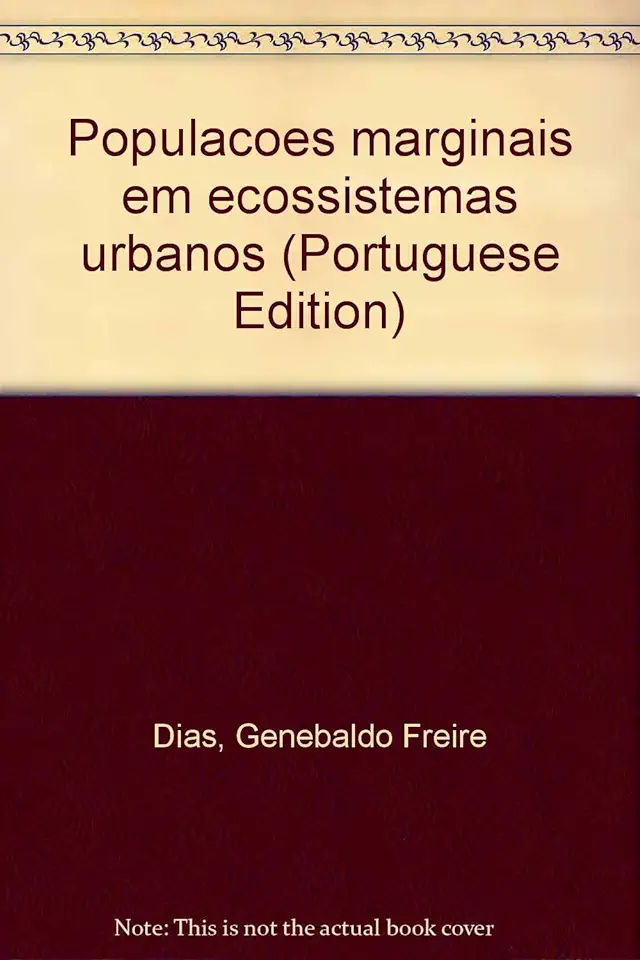
Marginal Populations in Urban Ecosystems - Genebaldo Freire Dias
Marginal Populations in Urban Ecosystems: A Comprehensive Exploration of Urban Poverty and Social Exclusion
Introduction: Unveiling the Hidden Realities of Urban Life
In the bustling metropolises of the modern world, where skyscrapers pierce the sky and neon lights illuminate the night, there exists a hidden reality—a world of marginal populations struggling to survive amidst the shadows of affluence. Marginal Populations in Urban Ecosystems, a groundbreaking work by renowned urban sociologist Genebaldo Freire Dias, delves deep into the lives of these marginalized communities, shedding light on their plight and offering a path towards understanding and addressing their unique challenges.
Understanding Marginalization: A Multifaceted Perspective
Marginalization, a complex phenomenon rooted in social, economic, and political factors, affects a significant portion of urban populations. Dias masterfully dissects the various dimensions of marginalization, encompassing issues of poverty, homelessness, unemployment, discrimination, and social exclusion. Through compelling case studies and in-depth analysis, the book provides a comprehensive understanding of the causes and consequences of marginalization, challenging readers to confront the harsh realities that exist within their own cities.
Poverty: The Crushing Weight of Economic Disparities
Poverty, a persistent and pervasive issue in urban ecosystems, is examined in detail by Dias. He paints a vivid picture of the daily struggles faced by those living in extreme poverty, highlighting the lack of access to basic necessities such as housing, healthcare, and education. The book exposes the structural barriers that perpetuate poverty, including inadequate social safety nets, discriminatory practices, and the erosion of labor rights. By humanizing the experiences of the impoverished, Dias compels readers to question the systemic inequalities that perpetuate this devastating condition.
Homelessness: Living on the Fringes of Society
Homelessness, a visible manifestation of urban marginalization, is explored with empathy and insight. Dias delves into the lives of those who have lost their shelter, revealing the complex interplay of personal circumstances, mental health issues, and societal failures that contribute to this devastating condition. The book challenges common misconceptions about homelessness, shedding light on the diverse backgrounds and experiences of those living on the streets. By fostering compassion and understanding, Dias encourages readers to demand more effective policies and support systems to address this pressing social issue.
Unemployment: The Struggle for Economic Empowerment
Unemployment, a persistent challenge in urban areas, is examined through the lens of marginalization. Dias analyzes the factors that contribute to high unemployment rates among marginalized populations, including lack of education, job discrimination, and the changing nature of the labor market. The book highlights the devastating impact of unemployment on individuals, families, and communities, emphasizing the need for comprehensive strategies to promote job creation, skills development, and equal opportunities. By shedding light on the structural barriers to employment, Dias calls for a collective effort to ensure economic empowerment for all.
Discrimination: The Invisible Barriers to Inclusion
Discrimination, a pervasive force in urban ecosystems, is explored with unflinching honesty. Dias exposes the various forms of discrimination faced by marginalized populations, including racism, sexism, xenophobia, and classism. The book delves into the psychological, social, and economic consequences of discrimination, highlighting its insidious impact on individuals and communities. By confronting the uncomfortable truths of prejudice and bias, Dias challenges readers to actively combat discrimination and promote inclusivity in all aspects of urban life.
Social Exclusion: The Isolation of the Marginalized
Social exclusion, the most insidious form of marginalization, is examined with sensitivity and insight. Dias reveals the mechanisms that exclude marginalized populations from participating fully in society, including lack of access to education, healthcare, housing, and social networks. The book explores the devastating effects of social exclusion on individuals, families, and communities, emphasizing the importance of fostering social cohesion and breaking down the barriers that perpetuate isolation. By shedding light on the hidden realities of social exclusion, Dias inspires readers to work towards creating more inclusive and equitable societies.
Conclusion: A Call to Action for Urban Transformation
Marginal Populations in Urban Ecosystems concludes with a powerful call to action, urging readers to confront the challenges of urban marginalization and work towards transformative change. Dias offers a roadmap for addressing the root causes of poverty, homelessness, unemployment, discrimination, and social exclusion, emphasizing the need for collaborative efforts involving governments, civil society organizations, and individuals. By raising awareness and inspiring action, the book empowers readers to become agents of positive change, working towards creating more just, equitable, and inclusive urban ecosystems.
Why You Should Read This Book:
- Gain a comprehensive understanding of urban marginalization and its various dimensions.
- Develop empathy and compassion for the struggles faced by marginalized populations.
- Challenge common misconceptions and stereotypes about poverty, homelessness, unemployment, discrimination, and social exclusion.
- Learn about the root causes of marginalization and the structural barriers that perpetuate it.
- Discover effective strategies and policies to address urban marginalization and promote social inclusion.
- Become an agent of positive change, working towards creating more just, equitable, and inclusive urban ecosystems.
Marginal Populations in Urban Ecosystems is a must-read for anyone interested in urban sociology, social policy, urban planning, or simply understanding the complex realities of modern cities. With its compelling narrative, rigorous research, and passionate call to action, this book is an essential resource for anyone committed to building more inclusive and sustainable urban communities.